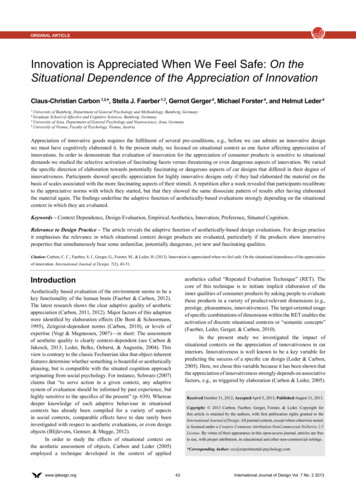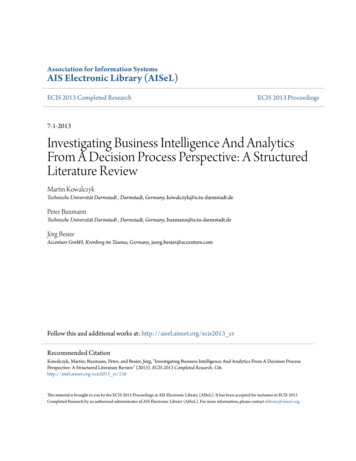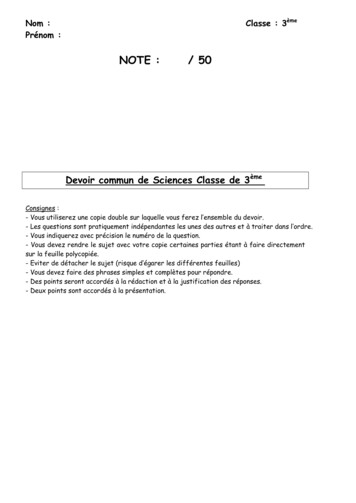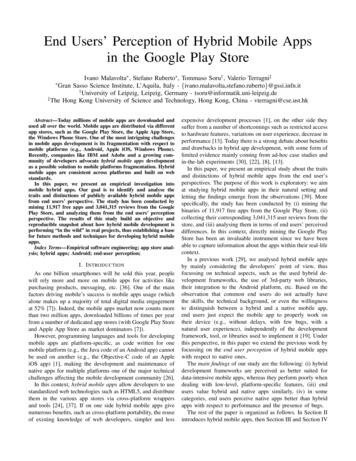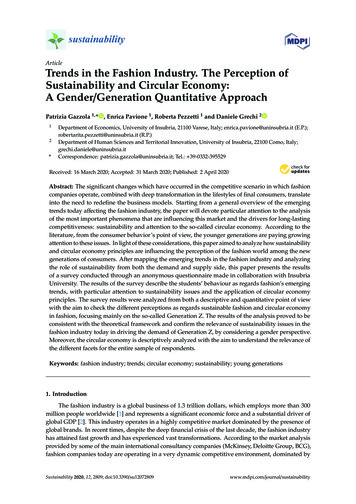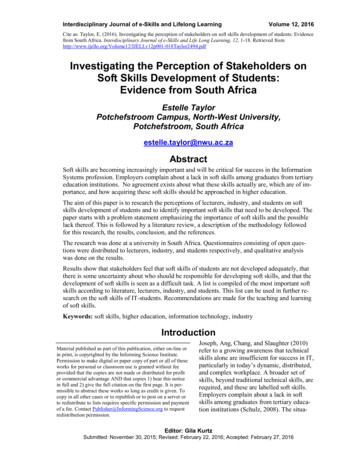
Transcription
Interdisciplinary Journal of e-Skills and Lifelong LearningVolume 12, 2016Cite as: Taylor, E. (2016). Investigating the perception of stakeholders on soft skills development of students: Evidencefrom South Africa. Interdisciplinary Journal of e-Skills and Life Long Learning, 12, 1-18. Retrieved 8Taylor2494.pdfInvestigating the Perception of Stakeholders onSoft Skills Development of Students:Evidence from South AfricaEstelle TaylorPotchefstroom Campus, North-West University,Potchefstroom, South Africaestelle.taylor@nwu.ac.zaAbstractSoft skills are becoming increasingly important and will be critical for success in the InformationSystems profession. Employers complain about a lack in soft skills among graduates from tertiaryeducation institutions. No agreement exists about what these skills actually are, which are of importance, and how acquiring these soft skills should be approached in higher education.The aim of this paper is to research the perceptions of lecturers, industry, and students on softskills development of students and to identify important soft skills that need to be developed. Thepaper starts with a problem statement emphasizing the importance of soft skills and the possiblelack thereof. This is followed by a literature review, a description of the methodology followedfor this research, the results, conclusion, and the references.The research was done at a university in South Africa. Questionnaires consisting of open questions were distributed to lecturers, industry, and students respectively, and qualitative analysiswas done on the results.Results show that stakeholders feel that soft skills of students are not developed adequately, thatthere is some uncertainty about who should be responsible for developing soft skills, and that thedevelopment of soft skills is seen as a difficult task. A list is compiled of the most important softskills according to literature, lecturers, industry, and students. This list can be used in further research on the soft skills of IT-students. Recommendations are made for the teaching and learningof soft skills.Keywords: soft skills, higher education, information technology, industryIntroductionMaterial published as part of this publication, either on-line orin print, is copyrighted by the Informing Science Institute.Permission to make digital or paper copy of part or all of theseworks for personal or classroom use is granted without feeprovided that the copies are not made or distributed for profitor commercial advantage AND that copies 1) bear this noticein full and 2) give the full citation on the first page. It is permissible to abstract these works so long as credit is given. Tocopy in all other cases or to republish or to post on a server orto redistribute to lists requires specific permission and paymentof a fee. Contact Publisher@InformingScience.org to requestredistribution permission.Joseph, Ang, Chang, and Slaughter (2010)refer to a growing awareness that technicalskills alone are insufficient for success in IT,particularly in today’s dynamic, distributed,and complex workplace. A broader set ofskills, beyond traditional technical skills, arerequired, and these are labelled soft skills.Employers complain about a lack in softskills among graduates from tertiary education institutions (Schulz, 2008). The situa-Editor: Gila KurtzSubmitted: November 30, 2015; Revised: February 22, 2016; Accepted: February 27, 2016
Soft Skills Development of Studentstion is further complicated because no agreement exists about what these skills actually are,which are of importance and how acquiring them should be approached in higher education(Adomssent et al., 2007). For many years industry recruiters have been emphasizing the importance of soft kills, e.g., interpersonal communication skills and teamwork (Russell, Russell, &Tastle, 2005). The possession of soft skills is strongly associated with life and employment success (Gibb, 2014) and the realisation of importance of soft skills is on the increase (Azim et al.,2010).According to Bancino and Zevalkink (2007) the increased demand for a broader skill set is because of the necessity for improvements to the bottom line, increasing competition, and globalization. Business executives consider soft skills a very important attribute in job applicants becausesoft skills are seen as critical for productive performance (Robles, 2012).It is not enough to be academically strong; employees need to work with other cultures, communicate well, and be punctual and dependable (Gewertz, 2007). Soft skills are becoming increasingly important, and soft skills such as teamwork and collaboration, planning and leadingprojects, presentation delivery, and writing skills will be critical for success in the InformationSystems profession (Noll & Wilkins, 2002).The aim of this paper is to research the perceptions of lecturers, industry, and students on softskills, and to identify important soft skills that need to be developed. The paper starts with a problem statement emphasizing the importance of soft skills and the possible lack thereof. In the literature review the terminology is defined, and a list of important soft skills is compiled. This is followed by a description of the methodology followed for this research, the results, conclusion andthe references.Problem StatementBancino and Zevalkink (2007) wrote that the focus of education and training is on technical topics and mathematics, science, and technical skills, yet the fast-paced, global marketplace of todayis demanding more. Technical professionals in disciplines such as information technology, engineering, architecture, and research and development are increasingly required to broaden theirskill sets to master the so-called soft skills.The skills gap that has employers worried isn’t the technical skills gap, but the soft skills gap.Senior management complain about the lack of soft skills in new employees and emphasize thatknowledge alone is not enough to succeed, but that effective communication also influences success (Klaus, 2010). The practical importance of soft skills has been amply illustrated through research attempting to define factors related to project and project management success (Stevenson& Starkweather, 2010).Technical skills are a part of most educational curricula, but soft skills need further emphasis inthe university curricula (Robles, 2012). Douglas (2002) argues, “.it is an accepted truism thatsome people who are gifted from a scientific and technical point of view find their career progress checked by their fundamental difficulties with managing people. They cannot be blamed fortheir lack of facility in this area, their entire training has been based around acquiring the rigorous knowledge they need to succeed at a technical level in their industry. Expecting them automatically to excel at managing people is at best naive and at worst quite unreasonable”. Employees who excel on the scientific and technical front but not on other skills such as managing andworking with others will be of much less value to organizations in the future.According to Hazzan and Har-Shai (2013) a Google search reveals that almost all problems associated with software development processes are connected to people and are rooted not in technological aspects but in the expression of soft skills. Johnston and McGregor (2004) are of the opin-2
Taylorion that failures associated with professional services can have serious economic and human consequences and that professionals need the professional skills and attitudes involved in recognizingother perspectives and valuing diverse contributions.From this it can be concluded that soft skills are very important and that there is a perception thatrecently graduated students generally lack these important soft skills. As stated earlier, the aim ofthis paper is to research the perceptions of lecturers, industry, and students on soft skills and toidentify important soft skills that need to be developed.The following section summarizes information from current literature on soft skills.Literature ReviewIn this literature review terminology is defined, and a list of important soft skills is compiled fromliterature.TerminologySkill has always been an elusive concept. The increasing prominence of soft skills has added tothis complexity (Grugulis & Vincent, 2009). The tacit nature of soft skills makes it difficult toobserve and challenging to measure. There is no globally accepted definition of soft skills. Eachdiscipline, educational sector and country defines soft skills according to their own needs(Kechagias, 2011).Terminology being used include soft skills, applied skills and 21st-century skills (Gewertz, 2007)and practical intelligence (Joseph et al., 2010). Joseph et al. (2010) define the practical intelligence of professionals as the managerial, intrapersonal, and interpersonal skills that are used toresolve work problems. Other possible terms suggested for these skills include nontechnicalskills, general skills, generic skills, essential skills, and employability skills (Johnston &McGregor, 2004); and behavioural skills (Wilhelm, Logan, Smith, & Szul, 2002). Kechagias(2011) refers to different terms being used, for instance enabling skills, generic skills, core skills,key competencies, essential skills, and necessary skills.Although a large number of definitions may be found in the literature on the concept of skill,most emphasize that all skills are capable of being learned and developed, and involve the appropriate and observable performance of particular types of activity and tasks (Kechagias, 2011).Soft skills are defined as intra- and inter-personal skills, essential for personal development, social participation, and workplace success and should be distinguished from technical or hard skills(Kechagias, 2011). Soft skills are also defined as nontechnical skills, abilities, and traits requiredto function in a specific employment environment (Wilhelm et al., 2002).Soft skills may differ, but according to Gibb (2014) they all share a common purpose and that isto improve personal development, participation in learning and success in employment. Robles(2012) writes that hard skills are the technical expertise and knowledge needed for a job whilesoft skills are interpersonal qualities, also known as people skills. Azim et al. (2010) refer to hardskills as processes, tools, and techniques while soft skills are seen as skills dealing with humanissues or the people part of the project. Soft skills are necessary to deal with people and hardskills to analyse and predict (Azim et al., 2010).For the purpose of this study, the term soft skills is used, and it is defined as intra- and interpersonal skills essential for personal development, social participation, and required to function ina specific employment environment.3
Soft Skills Development of StudentsTypes of Soft SkillsJoseph et al. (2010) write about four dimensions of soft skills (or what they call practical intelligence), namely managing tasks, managing career, managing self, and managing others (includingsuperiors, subordinates, peers, clients, etc.). There are a core set of soft skills that are common tomost all programs. These are, according to Bancino and Zevalkink (2007), face-to-face communications, nonverbal communication, active listening, writing and presentation skills, selfawareness, social awareness, relationship management, conflict management, leadership, teamwork, emotional intelligence, negotiation skills, change management, and team problem solving.Robles (2012) identified the top 10 soft skills perceived as the most important by business executives: integrity, communication, courtesy, responsibility, social skills, positive attitude, professionalism, flexibility, teamwork, and work ethic. According to Andrews and Higson (2008) themost important transferable soft skills impacting employability of graduates are professionalism,reliability, the ability to cope with uncertainty, the ability to work under pressure, the ability toplan and think strategically, the capability to communicate and interact with others, good writtenand verbal communication skills, information and communication technology skills, creativityand self-confidence, good self-management and time-management skills, a willingness to learnand accept responsibility. Azim et al. (2010) emphasize most of the skills already mentioned, ascan be seen in Table 1.According to Russell et al. (2005) the soft skills most frequently enumerated by industry are effective interpersonal relations, self-management strategies, teamwork, problem-solving, and decision-making. Gewertz (2007) mentions the ability to work comfortably with people from othercultures, problem-solving, the ability to write and speak well, the ability to think in a multidisciplinary way, and the ability to evaluate information critically, as well as being punctual and dependable. Another possible list is that of González-Morales, De Antonio, and García (2011): report writing, teamwork, client management and client expectations, leadership and supervision,decision making, conflict management, critical thinking, and communication of results.From these and other sources a list of soft skills was compiled, as can be seen in Table 1. Some ofthe soft skills could perhaps be combined, but are kept separate here to keep true to the originalsource. Skills are ordered according to the frequency with which they were mentioned in the different sources, and then alphabetically.Table 1 List of soft skills according to different sources from literatureXXXXXXXXXXXXXXXXXXXXXXXX(CasnerLotto s etal., 2011)X(Gewertz,2007)X(Russell etal., 2005)X(Azim etal., 2010)(Andrews& Higson,2008)4(Robles,2012)Communication (verbal andwritten)TeamworkProfessionalismFlexibility / ability to copewith uncertaintyInterpersonal relationsLeadershipProblem-solvingResponsibility / reliabilityWork ethic / IntegrityConflict managementCourtesyCreativity(Bancino &Zevalkink,2007)Soft skillXXXXXXXXXXXXXXXXXX
TaylorTable 1 List of soft skills according to different sources from literatureX(CasnerLotto rales etal., 2011)X(Gewertz,2007)X(Russell etal., 2005)XXX(Azim etal., 2010)X(Andrews& Higson,2008)(Robles,2012)Critical elf-managementTime-management / punctualityWillingness to learnClient managementCross-cultural relationshipsEmotional intelligenceHandling pressureMulti-disciplinary thinkingPositive attitude(Bancino &Zevalkink,2007)Soft skillXXXDevelopment of Soft SkillsSoft skills are necessary for an individual to communicate, work as a member of a team, inspireconfidence, and understand and adapt to the cultural norms of the workplace (Wilhelm et al.,2002). The nature of IT professionals’ jobs are changing, and because of this job roles, requiredskills, and personal attributes required for successful IT employees are changing (Gallivan, TruexIII, & Kvasny, 2004). Trauth, Farwell, and Lee (1993) also writes that career paths of IS professionals are changing because of restructuring of IS activities. A study by Lee, Trauth, and Farwell(1995) showed that respondents considered technical specialties knowledge to be the least important, for both now and in the future, and business functional knowledge and interpersonal/management skills the most important in the future. IS managers with sufficient human relationsand management training and who can communicate effectively remain a necessary, importantbut scarce resource (Trauth et al., 1993).According to a study by Wynekoop and Walz (2000) exceptional personnel are distinguished bythe following abilities: the ability to abstract business problems,creativity,technical and business knowledge,the ability to work with, and lead, teams,analytical and logical abilities,high levels of self-motivation, anddependability.Graduates who intend to work in user areas require a strong background in business managementand human relations. The challenge for educators and educational institutions is to change thecurriculum to accommodate teaching and learning for this diversity of career paths (Lee et al.,1995). IS students can benefit from formal training / education in creative problem solving, leadership, and communication skills (Wynekoop & Walz, 2000). Even though maintaining a productive relationship with the user/client is viewed by many practitioners as the most important ofskills, it apparently receives little attention in the classroom (Trauth et al., 1993).5
Soft Skills Development of StudentsSoft skills require a different strategy for both teaching and evaluating than other skills (Wilhelmet al., 2002). There is not a single best approach for teaching soft skills, as the most appropriateone depends on the context under which the teaching is taking place, the specific goals of theprogram, and the discipline (Kechagias, 2011). Hazzan and Har-Shai (2013) write that soft skillscannot be studied and taught formally and, rather, should be learned and over a period of time,based on students’ engagement, active learning, and reflection.Research by Joseph, Ang, and Slaughter (1999) showed that there is a difference between the softskills of experienced I/S professionals and inexperienced undergraduates, suggesting that exposure to work situations is extremely important in developing soft skills. Real-world examples canalso help students relate to the importance of soft skills (Bancino & Zevalkink, 2007).Recommendations for the development of soft skills are the following (Russell et al., 2005): Encourage students to dialog with others by outcomes that include a short presentation, shortpanel discussion, or in-class Question and Answer sessions. Students must be required to work cooperatively with others toward a common goal. Instructors should strive to find learning outcomes that involve teaming, leadership, presentations, interviews, or panel discussions. Teaming builds both leadership skills and an ability tolisten and follow the leadership of others.To summarize, according to available literature, soft skills are very important, but difficult toteach. Recommendations from literature for the teaching and learning of soft skills are engagement of students, active learning, reflection, exposure to work situations, real-world examples,encouraging dialog, cooperative work with a common goal, and striving to find learning outcomes involving leadership, teaming, presentations, discussions, etc.MethodologyData Gathering and AnalysisThe research was done at a university in South Africa. After the literature review was done, aquestionnaire was created. The questionnaire consisted of open questions, and qualitative analysis was done on the results. All of the questionnaires were distributed and received back duringthe months October and November of 2015. Qualitative analysis was chosen because the aim wasto gain a deeper understanding of the situation.Questionnaire 1 (Industry) consisted of five questions: Which five of the mentioned soft skills (or others not listed) do you think are most importantfor IT-graduates in the working environment? List in order of importance. Do you think these soft skills are developed sufficiently during the students’ university education?Yes / No. Please motivate your answer. With which of the soft skills do graduates have the biggest problem? How can these skills be improved at university level – any suggestions? Any other comments on this topic?This questionnaire was e-mailed to twenty-five IT companies who have previously employed ourstudents. Twelve responses were received.Questionnaire 2 (Lecturers) had the following additional question for each module they teach:6
Taylor List the modules you teach and indicate which soft skills, if any, are developed in each module.This questionnaire was e-mailed to the eleven lecturers responsible for teaching and learning ofIT subjects All of the lecturers answered the questions.Questionnaire 3 (Students) had the following additional question: Which soft skills were developed in the program you followed (graduate and post graduate)?Indicate specific modules as well where possible.This questionnaire was e-mailed to the thirty-nine students who have recently completed theirpost graduate studies in IT at the Potchefstroom Campus. Ten responses were received.ResultsIn this section the results of the different questionnaires are described under the headings perception of lecturers, perception of industry and perception of students.Perception of LecturersFeedback from lecturers is described under the following headings: the most important soft skillsaccording to lecturers, the perception of the development of these soft skills, and the soft skillswhere the biggest shortcomings exist according to the lecturers. This is followed by a list of softskills developed in the different subject areas that form part of the IT-program.Most important soft skills according to lecturersIn Table 2 a list can be seen of the soft skills lecturers thought most important. Soft skills are ordered according to the frequency with which they were mentioned in the responses from lecturers. Respondents had to list the soft skills in order of importance (1-5). These rankings are alsoshown in the table.SkillTable 2 Most important soft skills according to lecturers (N 10)1-5 1-5 1-5 1-5 1-5 1-5 1-5 1-5 1-5 1-5Communication (verbal and written)Work ethicMulti disciplinary thinkingSelf-managementDecision makingTeamworkInterpersonal relationsConflict managementEagerness to smSelf confidenceClient managementPositive attitudeTime 3355155222131117
Soft Skills Development of StudentsPerception of the Development of Soft Skills According to LecturersThe lecturers were asked if the soft skills are developed adequately during the students’ universitystudies. Only one lecturer answered yes. Six answered no and four were unsure. These lecturersfelt that some of the soft skills are developed but not all of them.Some interesting comments were:“It is the responsibility of the student to give attention to developing these skills on a daily basis”.“The skills are not always developed as expected because students do not always do what is expected of them”.“It is still not enough although, in my opinion, we do more than most subject groups or universities to develop these skills”.“There isn’t enough time to focus on all the necessary skills”.“Most of these skills are not developed in the class room but outside of the classroom where, forinstance, team work is done”.“The size of groups has a negative impact on the development of soft skills. Not enough attentioncan be given to each student to develop and evaluate soft skills”.“Students should complete more assignments in teams. Assignments should consist of parts thatare inter-dependant”.“The students grow up with the perception that it is good enough to do the minimum to pass.They should be motivated to always do their best”.Soft skills where the biggest shortcomings exist according to thelecturersVerbal and written communication was mentioned by six lecturers and work ethics and self management by three. Team work was mentioned twice. Willingness to learn, negotiation, decisionmaking, client management, professionalism, and time management were also mentioned.Interesting comments were:“Development of soft skills differs from student to student according to experience and maturity”.“Students don’t do what was asked of them but what they are comfortable with. They do not havethe necessary respect for others. Lecturers have to make sure that students learn to follow therules. This will help with soft skills, e.g., communication, work ethics and self management”.“Lecturers do not always have time to teach these soft skills as well as the relevant technicalskills. Students can be encouraged to do short courses on soft skills”.“Maybe we should get feedback from industry and alumni to identify soft skills that are seen asproblem areas. We can also use experts to present lecturers and workshops”.Soft skills being taught in the IT-program according to lecturersLecturers were asked which soft skills are, according to them, developed in the modules theyteach. Lecturers responded for 23 different subject areas that form part of the graduate and postgraduate program. Soft skills mentioned were communication (mentioned 14 times), selfmanagement (11), teamwork (10), interpersonal relations (9), conflict management (9), leadership(6), decision making (4), work ethic (4), multi disciplinary thinking (4), professionalism (2), negotiation (2), flexibility (2), cross cultural relationships and self confidence.8
TaylorPerceptions of IndustryFeedback from industry is described under the following headings: the most important soft skillsaccording to industry, the perception of the development of these soft skills, the skills where thebiggest shortcomings exist according to the industry, and suggestions from industry for improvement of soft skills.Most important soft skills according to industryIn Table 3 a list can be seen of the soft skills industry thought most important. Soft skills are ordered according to the frequency with which they were mentioned in the responses from industry.Respondents had to list the soft skills in order of importance (1-5). These rankings are also shownin the table.Table 3 Most important soft skills according to industry (N 11)Skill1-5 1-5 1-5 1-5 1-5 1-5 1-5 1-5 1-5 1-5 1-5Communication (verbal and writ- 4154Teamwork13312Multi-disciplinary thinking45535Client management3321Decision making5413Conflict management132Work ethic224Interpersonal relations53Negotiation43Self confidence53Critical thinking2Emotional intelligence2Professionalism1Perception of the development of soft skills according to industrySeven of the twelve respondents from industry indicated that the skills are not developed adequately at university. Three disagreed and felt that the soft skills are indeed up to standard. Twowere conflicted.Interesting comments:“Students who completed the post graduate year do very good to adapt to the working environment. The students we employ from your campus are definitely better than the average studentfrom other universities. You do good work with these students”.“Students do not learn good time management”.“Due to the nature of university most of the projects that students will work on will be preplanned and have a set road map. Which is understandable because at the end of the day studentsneed to be award marks for work which can be compared back to some type of standard or marksheet. However in the work environment, requirements for projects will change, be ambiguousand be misinterpreted between parties. This results in the need for client management, negotiation and flexibility. This also results inadvertently in the potential for ethical decision like the9
Soft Skills Development of Studentsmost common “do we let the client know about this ”. It will be very hard for a university program to replicate this type of environment”.“Yes and No, I believe that a lot of the soft skills are addressed, such as communication and teamwork. I do however feel there is room for improvement for emotional intelligence, which is verydifficult to teach and for multi-disciplinary thinking, which is often a problem for IT graduates”.“From my experience it seems that team work and communication are well developed. The biggerproblem is email communication that tends to be the lifeblood of communication in industry butmost graduates prefer using whatsapp, skype and social media for communication. I howeverthink it is industry that has to adapt here”.“In the industry a large part of each day is spent on communication (e-mail, meetings, etc.). Thequality of this communication determines how effective your work is done. In comparison, most ofyour time at university is spent on own studies and assignments. Teamwork is the exception, butthen all team members usually have the same background and skills”.“No, we find well qualified individuals battling with these basic skills on an ongoing basis.Graduates are largely immature when they arrive at the workplace and a lot more can be done atuniversity to address this”.Soft skills where the biggest shortcomings exist according to theindustryCommunication was mentioned four times, conflict management and multi-disciplinary thinkingthree times, client management and flexibility two times, and self management, cross-culturalrelationships, decision making and emotional intelligence were also mentioned. Communicationin English was mentioned specifically (as our students are taught mainly in their mother tongue,Afrikaans).Suggestion from industry for improvement of soft skillsOne suggestion was that students should work in the industry during the holidays. Another suggestion was that students should work with students from other faculties.Interesting comments were: “IT students should get a better understanding of the industry so thatthey know what to expect and what will be expected from them. This will help for the preparation.”“Give students’ real world projects with real world clients or maybe try and define a project thatwill have change, but the change is based off the actions taken by the students”.“The challenge here is to get the individual solving the problem to think wider, evaluate the pro’sand con’s of more options before implementing anything, and even then to keep an open mindand not “fall in love” with the solution they selected. Get the individual tasked with finding a solution to
Material published as part of this publication, either on-line or . wrote that the focus of education and training is on technical to p-ics and mathematics, science, and technical skills, yet the fast -paced, global marketplace of today . skill s

